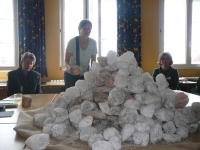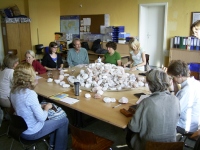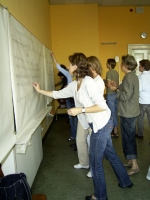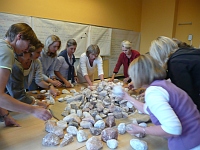
Second Warmth Sculpture Workshop
The second Warmth Sculpture Workshop took place from the 18th to 20th September 2009.
What prevents us from addressing the essential tasks in the school? How can we free ourselves from ballast, from what is dispensible, superfluous, from what is not or no longer necessary? The aim of this workshop was to clear out the school's social and organisational space and structures. For how can anything new, however desirable it might be, come into he world, into the school, when there is virtually no space? In addition to all those who attended the first workshop in may, we could now welcome some additional members of the teaching staff and some more parents too. Again we worked for two whole days.
The process started with a silence. It was devoted to the lumps of salt heaped on the centre of our huge worktable. Until two days earlier this salt had lain almost 3000 metres under the earth - as part of an enormous salt deposit under Lüneburg extending eastwards deep into Poland and far northwards into Scandinavia. The salt had been unearthed at the exploration mine in Gorleben, a place just 50km from Lüneburg that has been earmarked for underground nuclear waste disposal.
Thus, to us the salt can be a symbol of Lüneburg's natural wealth. As a substance it also teaches us to differentiate between mere intellect and living spirit. And heaped up here on the table between us, preventing us from seeing each other properly, from communicating properly, it also symbolises the abovementioned loads and ballast that blocks and distorts the school's social organism. The first day of the workshop was dedicated to what we wanted to clear out, the second day with how we can do it. In view of the "how" we found ourselves inspired by Mahatma Gandhi's salt march, confronted with the question: When given school regulations are partly senseless, can civil disobedience then, perhaps in certain cases, become a strategy to achieve pedagogic improvements?
In this workshop the enormous need for change in the school became even more tangible than in the previous one. At the same time a huge readiness for change also emerged. Hence the school is in a field of change - full of partly painful questions, opposing forces and uncertainties, but this field also sets new energies free.
At the end of the workshop, the heap of salt which had initially impeded our communication was jointly transformed into such a field of change.
We all need to be the change that we want to see in the world
Mahatma Gandhi



